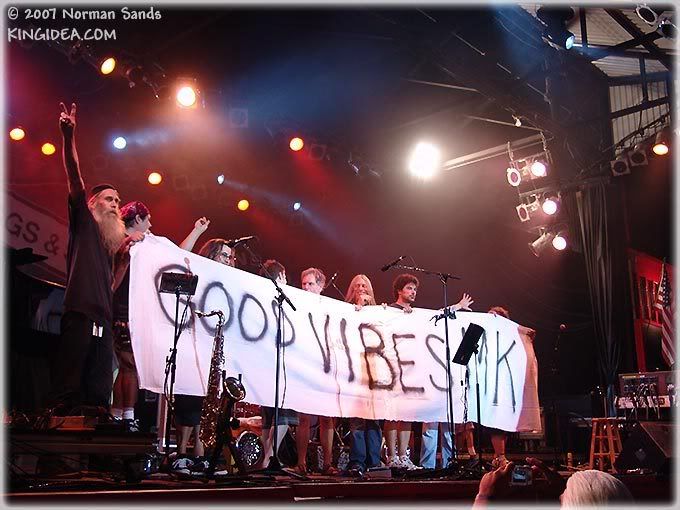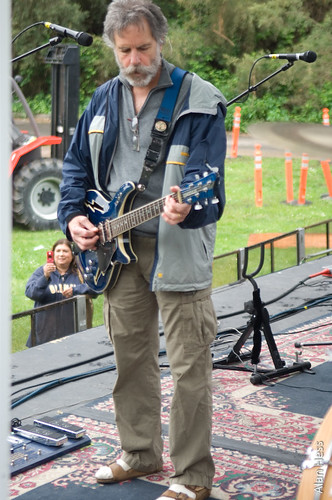Bob Weir's Little Walk In The Woods
by Mike Muckian
July 05, 2007
When Bob Weir and Ratdog play the Briggs & Stratton Big Backyard at Summerfest July 5, it will be a homecoming for fans of both that group and the Grateful Dead, the San Francisco jam band Weir joined some 40 years ago. Weir played the Marcus Amphitheater with Ratdog last year, and with the Dead (the surviving members of the Grateful Dead) in 2003. In advance of his return, Weir talked about the art of songwriting and how he keeps his shows fresh.
Are there differences between Ratdog and the Grateful Dead?
We both state a theme and take it for a little walk in the woods. Like the Dead, our bag of tricks is the American musical heritage. The difference is the personnel. If you have a different set of crayons, you’re going to get a differently colored picture.
Our musical roots are Delta blues, R&B and various kinds of country, from Appalachia to Bakersfield. We also cover jazz of all types, from the old stuff to modern mainstream. Three of the band members are straight out [of the jazz] idiom. They weren’t purposely picked; they just showed up, so we’re going to drift that way a bit.
Where did the name “Ratdog” come from?
Stuff just comes to me. I just saw a vision, what came about as our first record cover, [which was] a kitten’s-eye view of a snarling little rat-dog menacing about the only thing on Earth he could menace, which would be a kitten.
It’s been more than 40 years since the Dead formed in San Francisco. Why has the music endured?
Our fans are a certain kind of people, kindred spirits who require a little adventure in life, and the music that we listen to has to reflect that. A lot of us will probably end up as jazz fans, but early in life people begin making that transition, some to improvisational music. They want to hear some risk-taking and some sublime moments when those risks are found to have been worth taking. Those are the people who find our music and come to our shows.
It sounds like your fans play an active rather than passive role during your performances.
The show we present is the sum total of everyone in attendance. The music happens at … a point somewhere between the audience and the band. The audience feeds us energy and we turn around and articulate it. Somewhere in that spin between band and audience the art happens.
A lot of fans provide you with repeat business, often attending multiple shows in as many days. How do you keep things fresh for them?
Our repertoire is pushing 200 songs. I have a database of all past set lists and can see what we played when we came through a town. Songs performed during the last two to three visits are automatically out, along with songs from our last six or eight shows. From there I develop the evening’s list. If the band knows that the most often we’ll ever play a tune is once every couple of weeks while we’re on tour, we invest ourselves in that rendition because it’s the last crack we’ll get at it for a good while.
What constitutes a good song?
Whether a song lives and breathes is a matter of how the characters, the story, the rhythm, the melody and the chord progression all weave together to make a STORY, in capital letters. The storyteller has to step out of the way and let the story tell itself.
Bob Dylan is an amazing songwriter. Let’s take “A Hard Rain’s A-Gonna Fall.” It would be very difficult in words other than poetry to explain what he’s up to there, but you know what he means having heard the song. Another excellent song is [Harold Arlen and E.Y. Harburg’s] “Somewhere Over the Rainbow.” Everything falls together perfectly; there’s no question what that song is about. As a performer your job is to let that happen and invite the audience in to be part of that.
What’s the secret to being a successful singer-songwriter?
Love what you do and give it your best. The Dalai Lama described love as wanting the best for the object of your love: the best you have to offer, the best there is to offer and more. In the story [of the song] if the character is stepping through from somewhere between heaven, the dream world and the artist’s world, make sure there’s as much love as there possibly can be there, no matter who the character is, to guide him through.
That story may be a hateful one, but you still have to love it and invest your entire self in it. Consider Dylan’s “Masters of War.” He had to love the characters in that song with all his humanity and all the love he could bring to bear in order for those characters to reveal themselves and tell their story.
The article online
_______
A brief mention of RD3 in this article about benefit concerts
http://www.rockymountainnews.com/drmn/spotlight_columnists/article/0,2777,DRMN_23962_5618168,00.html







